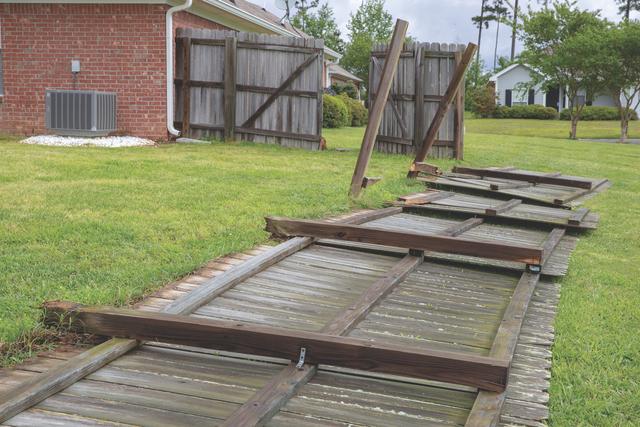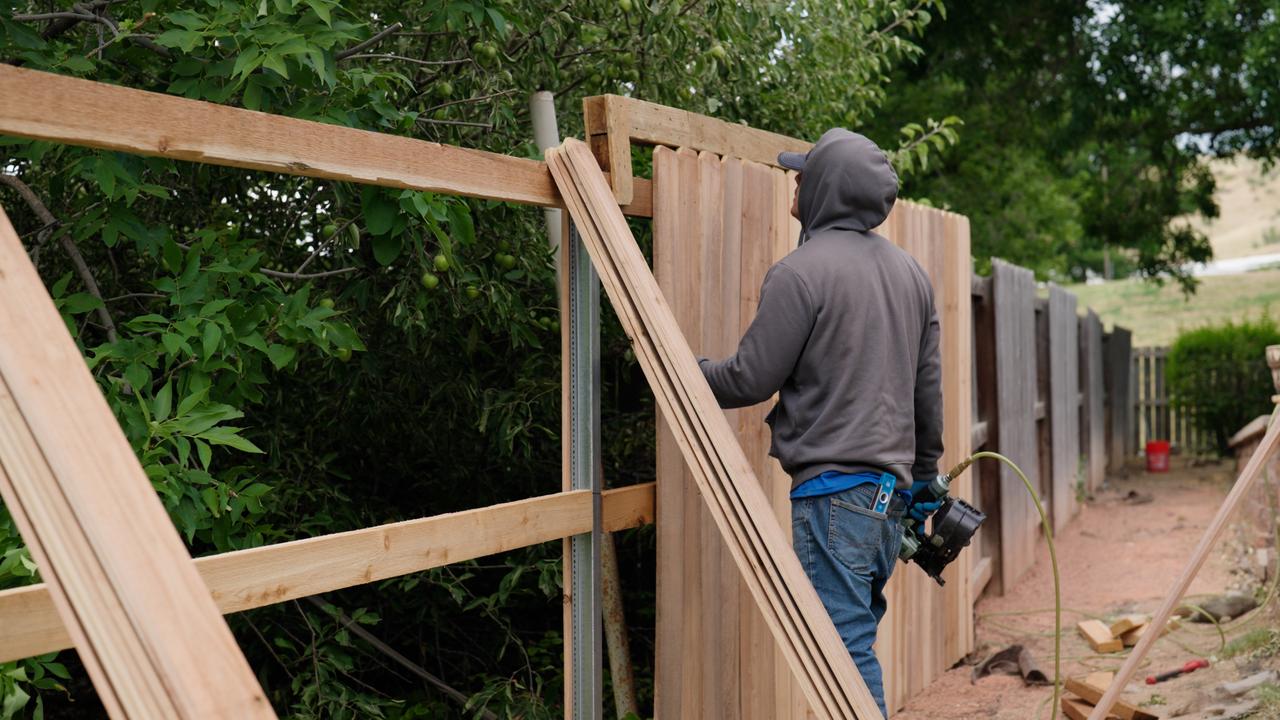Don't Let a Damaged Fence Ruin Your Southlake Home! A Homeowner's Guide to Fence Repair
 Your fence is more than just a boundary line; it's a crucial element of your Southlake property's security, privacy, and curb appeal. Whether it's a classic cedar fence, an elegant wrought iron design, or a practical chain link; a well-maintained fence contributes significantly to your peace of mind and property value. But Texas weather, everyday wear and tear, and the occasional unexpected event can all take their toll. That's where fence repair comes in.
Your fence is more than just a boundary line; it's a crucial element of your Southlake property's security, privacy, and curb appeal. Whether it's a classic cedar fence, an elegant wrought iron design, or a practical chain link; a well-maintained fence contributes significantly to your peace of mind and property value. But Texas weather, everyday wear and tear, and the occasional unexpected event can all take their toll. That's where fence repair comes in.
This guide is designed to help Southlake homeowners understand the ins and outs of fence repair, going beyond the basic services offered by local companies to provide you with valuable insights and empower you to make the best decisions for your property.
Get a FREE Repair QuoteCommon Fence Repair Needs in Southlake
Southlake properties boast a variety of fencing styles, and each material comes with its own set of potential issues. Here's a look at common repair needs you might encounter:
- Wood Fences (Cedar, Pine, Spruce): These are popular for their aesthetic appeal and privacy. Common repairs include replacing broken or rotting pickets, fixing leaning sections caused by post damage, addressing insect infestations (though Western Red Cedar is naturally resistant), and repairing gates that sag or don't latch properly. Regular staining and sealing (every 3-5 years for cedar) are crucial to prevent costly repairs down the line.
- Metal Fences (Wrought Iron, Ornamental Steel, Aluminum): Known for their durability and security, metal fences can suffer from rust, bent or damaged sections, and loose connections. Repair often involves treating rust, straightening or replacing damaged parts, and ensuring gates function smoothly. While modern galvanized powder-coated steel resists rust better than traditional wrought iron, maintenance is still important.
- Chain Link Fences: A practical and economical option, chain link fences can develop tears, bent posts, or loose wires. Repairs typically involve patching tears, straightening or replacing damaged components, and ensuring the fence remains taut and secure.
- Gates (Wood and Metal): Gates are moving parts and often experience more wear and tear than the fence itself. Issues can range from loose hinges and latches to problems with automatic gate operators. Timely repair is essential for security and convenience.
DIY vs. Calling a Professional: Knowing When to Act
For minor issues like replacing a single broken picket or tightening a loose screw, handy homeowners might consider a DIY approach. However, for more significant damage or complex repairs, it's generally best to call a qualified fence repair professional (like Stand Strong Fencing of Southlake). Consider seeking expert help if:
- Structural Integrity is Compromised: If posts are rotting or leaning significantly, or if large sections of the fence are damaged, the structural integrity is at risk, and professional repair is necessary for safety and longevity.
- Specialized Tools or Skills are Required: Repairing metal fences often involves welding or specialized tools. Addressing issues with automatic gates requires expertise in electrical systems.
- You're Unsure of the Cause or Solution: A professional can diagnose the underlying issue and ensure the repair is done correctly to prevent future problems.
- Warranty Concerns: If your fence is still under warranty, DIY repairs might void it. Check your warranty details.
Understanding the Culprits: Common Causes of Fence Damage in Texas
Texas weather can be unpredictable, and several factors can contribute to fence damage:
- Storm Damage: High winds can blow down sections of fencing, and hail can damage wood pickets. Falling trees or branches are also common causes of significant damage. Some companies even offer specific services for storm-related repairs.
- Moisture and Rot: Especially for wood fences, prolonged exposure to rain and humidity can lead to rot and decay, particularly in areas with poor drainage. Keeping plants and vines trimmed away from the fence can help prevent moisture damage.
- Insect Infestation: While Western Red Cedar offers natural resistance, other wood types can be susceptible to termites and other wood-boring insects. Regular inspections can help catch infestations early.
- Normal Wear and Tear: Over time, fences simply age. Wood can warp or crack, metal can rust, and connections can loosen. Regular maintenance can slow this process.
- Accidental Damage: Vehicles, landscaping equipment, or even pets can accidentally damage your fence.
Does Homeowner's Insurance Cover Fence Repair?
Whether your homeowner's insurance will cover fence repair depends on the cause of the damage and your specific policy. Generally, damage caused by events like severe weather (wind, hail, falling trees) might be covered, minus your deductible. However, damage due to neglect, normal wear and tear, or insect infestation is typically not covered. It's always a good idea to review your policy and contact your insurance provider to discuss your specific situation.
Choosing the Right Fence Repair Company in Southlake
 Selecting a reliable and trustworthy fence repair company is crucial for a successful outcome. Here are some factors to consider:
Selecting a reliable and trustworthy fence repair company is crucial for a successful outcome. Here are some factors to consider:
- Local Reputation and Experience: Look for companies with a strong reputation in the Southlake area and years of experience.
- Range of Services: Ensure the company offers repair services for your specific fence type (wood, metal, chain link) and can address the issues you're experiencing.
- Quality of Materials: Inquire about the materials they use for repairs.
- Warranty: Ask about any warranties offered on their repair work.
- Customer Reviews and Testimonials: Check online reviews and ask for references to gauge customer satisfaction.
- Free Estimates: Most reputable companies offer free estimates for repair work. This allows you to compare quotes and understand the scope of the repairs.
- Communication and Professionalism: From the initial contact to the completion of the job, the company should communicate clearly and demonstrate professionalism.
Understanding Potential Repair Costs
The cost of fence repair can vary depending on several factors, including:
- Type of Fence Material: Wood, metal, and chain link repairs can have different costs associated with materials and labor.
- Extent of the Damage: A few broken pickets will cost significantly less to repair than a collapsed section of fencing.
- Labor Costs: Repair companies will factor in their labor rates, which can vary.
- Materials Used: The quality and type of replacement materials will affect the cost. For instance, using Western Red Cedar might be more expensive upfront but offer long-term benefits.
- Complexity of the Repair: Fixing an automatic gate or dealing with structural issues will likely cost more than simple cosmetic repairs.
- Emergency Service: If you require immediate or after-hours repair, be prepared for potential additional charges.
While it's tempting to go with the cheapest option, remember that quality workmanship and materials are essential for a lasting repair. Some fence companies promote themselves on providing "good, cheap, and fast" service, but it's crucial to balance cost with quality.
Proactive Steps: Maintenance to Minimize Future Repairs
The best way to avoid frequent and costly fence repairs is to implement a regular maintenance routine. This includes:
- Regular Inspections: Periodically walk along your fence line, checking for loose boards, rust, sagging sections, and any signs of damage. Catching small issues early can prevent them from escalating.
- Promptly Addressing Problems: Don't ignore minor damage. Replace broken pickets, tighten loose screws, and treat rust as soon as you notice it.
- Keeping the Area Clear: Trim vegetation that could rub against or put pressure on your fence.
- Staining and Sealing Wood Fences: As mentioned earlier, this is crucial for protecting wood from moisture, UV rays, and insects.
- Maintaining Gates: Regularly check and lubricate hinges and latches to ensure smooth operation. For automatic gates, schedule professional maintenance to keep the system in good working order.
Conclusion: Protecting Your Investment with Stand Strong Fencing of Southlake
Your fence plays a vital role in defining and protecting your Southlake home. By understanding common repair needs, knowing when to seek professional help, and implementing proactive maintenance, you can ensure your fence remains a strong, secure, and beautiful asset for years to come. When the need for repair arises, choosing a reputable local company that prioritizes quality and customer satisfaction is key. Don't let a damaged fence detract from your property – take action to restore its integrity and enjoy the peace of mind a well-maintained fence provides.
Stand Strong Fencing of Southlake can help with all of your fence repair needs. Contact us for a free quote today and see why many homeowners in the DFW area are contacting us for all their fencing needs!
Schedule a Quote


